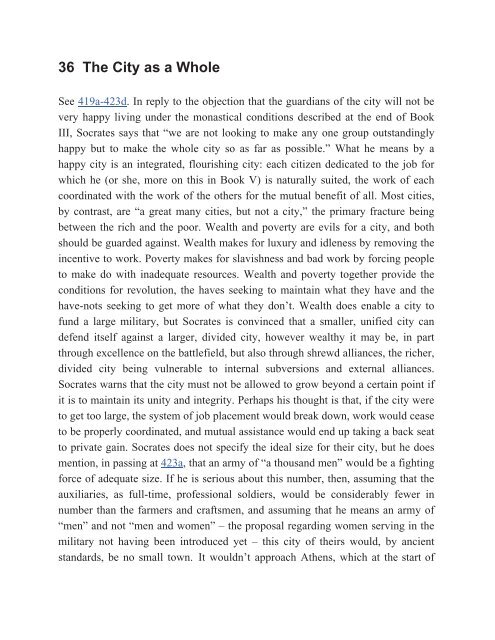The Intelligent Troglodyte’s Guide to Plato’s Republic, 2016a
The Intelligent Troglodyte’s Guide to Plato’s Republic, 2016a
The Intelligent Troglodyte’s Guide to Plato’s Republic, 2016a
Create successful ePaper yourself
Turn your PDF publications into a flip-book with our unique Google optimized e-Paper software.
36 <strong>The</strong> City as a Whole<br />
See 419a-423d. In reply <strong>to</strong> the objection that the guardians of the city will not be<br />
very happy living under the monastical conditions described at the end of Book<br />
III, Socrates says that “we are not looking <strong>to</strong> make any one group outstandingly<br />
happy but <strong>to</strong> make the whole city so as far as possible.” What he means by a<br />
happy city is an integrated, flourishing city: each citizen dedicated <strong>to</strong> the job for<br />
which he (or she, more on this in Book V) is naturally suited, the work of each<br />
coordinated with the work of the others for the mutual benefit of all. Most cities,<br />
by contrast, are “a great many cities, but not a city,” the primary fracture being<br />
between the rich and the poor. Wealth and poverty are evils for a city, and both<br />
should be guarded against. Wealth makes for luxury and idleness by removing the<br />
incentive <strong>to</strong> work. Poverty makes for slavishness and bad work by forcing people<br />
<strong>to</strong> make do with inadequate resources. Wealth and poverty <strong>to</strong>gether provide the<br />
conditions for revolution, the haves seeking <strong>to</strong> maintain what they have and the<br />
have-nots seeking <strong>to</strong> get more of what they don’t. Wealth does enable a city <strong>to</strong><br />
fund a large military, but Socrates is convinced that a smaller, unified city can<br />
defend itself against a larger, divided city, however wealthy it may be, in part<br />
through excellence on the battlefield, but also through shrewd alliances, the richer,<br />
divided city being vulnerable <strong>to</strong> internal subversions and external alliances.<br />
Socrates warns that the city must not be allowed <strong>to</strong> grow beyond a certain point if<br />
it is <strong>to</strong> maintain its unity and integrity. Perhaps his thought is that, if the city were<br />
<strong>to</strong> get <strong>to</strong>o large, the system of job placement would break down, work would cease<br />
<strong>to</strong> be properly coordinated, and mutual assistance would end up taking a back seat<br />
<strong>to</strong> private gain. Socrates does not specify the ideal size for their city, but he does<br />
mention, in passing at 423a, that an army of “a thousand men” would be a fighting<br />
force of adequate size. If he is serious about this number, then, assuming that the<br />
auxiliaries, as full-time, professional soldiers, would be considerably fewer in<br />
number than the farmers and craftsmen, and assuming that he means an army of<br />
“men” and not “men and women” – the proposal regarding women serving in the<br />
military not having been introduced yet – this city of theirs would, by ancient<br />
standards, be no small <strong>to</strong>wn. It wouldn’t approach Athens, which at the start of


















